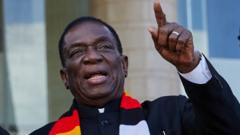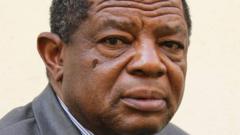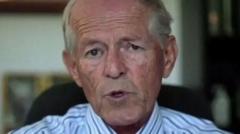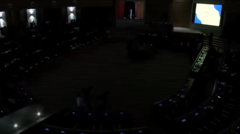President Emmerson Mnangagwa's recent approval of a bill mandating that all drivers obtain a radio license before renewing vehicle insurance has sparked significant backlash, with critics decrying the fee as excessively burdensome.
**Outrage Erupts as Zimbabwe Mandates Radio License Fee for Drivers**

**Outrage Erupts as Zimbabwe Mandates Radio License Fee for Drivers**
Zimbabwe's new radio license law requires motorists to pay $92 annually, intensifying public outrage amid economic challenges.
In a controversial move to bolster revenue for the state broadcaster, Zimbabwe's President Emmerson Mnangagwa has enacted a law requiring all motorists to purchase a radio license in order to secure vehicle insurance. The annual fee of $92 (£68) has incited strong reactions from the public, who express concerns over financial strain in a challenging economic climate.
Critics, including prominent opposition leader Nelson Chamisa, have labeled the legislation as “draconian” and indicative of a disconnect between the government and its citizens. Many argue that the fee is an unjust burden during a time of national hardship. Responding to these concerns, Nick Mangwana, a senior official in the Ministry of Information, defended the law, calling it both "necessary" and "fair."
The Zimbabwe Broadcasting Corporation (ZBC), which operates at a loss and relies on government grants and advertising revenues, hopes the new license requirement will increase compliance and income. However, many residents feel that ZBC's coverage favors the ruling Zanu-PF party, further complicating public sentiment toward the broadcaster.
Under the new Broadcasting Services Amendment Act, the license fee must be paid before any vehicle insurance can be renewed. This legislation also prohibits insurers from selling policies to drivers without a valid ZBC license, except for those who receive an exemption or own vehicles without radio capabilities. While ZBC can grant exemptions for certain individuals, including tourists, the overall mandate has faced fierce opposition.
As citizens grapple with the implications of this new financial requirement, voices across social media express frustration at what they perceive to be a heartless disregard for the struggles faced by Zimbabweans. The commentary reflects a growing sentiment that the leadership is out of touch with the realities of its people’s lives, deepening the divide between the government and its constituents.
Critics, including prominent opposition leader Nelson Chamisa, have labeled the legislation as “draconian” and indicative of a disconnect between the government and its citizens. Many argue that the fee is an unjust burden during a time of national hardship. Responding to these concerns, Nick Mangwana, a senior official in the Ministry of Information, defended the law, calling it both "necessary" and "fair."
The Zimbabwe Broadcasting Corporation (ZBC), which operates at a loss and relies on government grants and advertising revenues, hopes the new license requirement will increase compliance and income. However, many residents feel that ZBC's coverage favors the ruling Zanu-PF party, further complicating public sentiment toward the broadcaster.
Under the new Broadcasting Services Amendment Act, the license fee must be paid before any vehicle insurance can be renewed. This legislation also prohibits insurers from selling policies to drivers without a valid ZBC license, except for those who receive an exemption or own vehicles without radio capabilities. While ZBC can grant exemptions for certain individuals, including tourists, the overall mandate has faced fierce opposition.
As citizens grapple with the implications of this new financial requirement, voices across social media express frustration at what they perceive to be a heartless disregard for the struggles faced by Zimbabweans. The commentary reflects a growing sentiment that the leadership is out of touch with the realities of its people’s lives, deepening the divide between the government and its constituents.

















